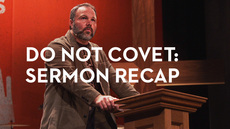Sin is like water. It always finds the cracks and the low points where it can settle in to cause erosion.
One of my aims with the Ten Commandments is to discuss each biblical principle and then provide a lot of practical examples to help us deal with the vulnerable areas in our lives where sin can seep in. Just as we seal countertops, decks, or driveways, we can seal our lives in places where sin is likely to invade.
The ninth commandment forbids lying, and most people would generally agree that telling the truth is a good thing. I can think of at least five ways, however, that most of us “bear false witness” on a regular basis. Watch out for these cracks on the driveway of your heart.
1. Flattery
Singles use flattery to win over a prospective mate. Kids use flattery to get an extra treat. Employees use flattery to land a raise or a promotion. Suck-ups, kiss-ups, and butter-ups violate the ninth commandment by not saying what’s true, and instead saying what other people want to hear in order to achieve a certain outcome.
Flattery can feel pretty good and yield some favorable results in the moment, but Psalm 12:2 warns, “Everyone utters lies to his neighbor; with flattering lips and a double heart they speak.” You can have a double mind. You can have a double tongue. Flattery is a double heart. It is insincere and excessive praise intended to manipulate.
On this point, it’s important to distinguish sinful flattery from the gift of encouragement. There’s nothing wrong with being a happy person who helps people look on the bright side. Some of us are not like that, and we desperately need your help.
My daughter Alexie has the gift of encouragement. When I have a rough week I often find a love letter and/or nice picture with a note from her to perk me up stuffed in my laptop or Bible. That’s not flattery. There’s a motive of the heart that’s different between encouragement and flattery.
2. Deception
Deception is where we twist the truth into a weapon for harm and destruction. Cheating in school. Half-truths on a resume. Falsifying reports at work. Double-billing clients. And, pastors are notorious for “borrowing” material.
All of us are guilty of deception to some degree. Its prevalence, however, does not change the fact that deception is a demonic, satanic issue. In Genesis 3, God creates our first parents and speaks the truth to them, and then Satan comes and lies to them. They sin against God. Further on the Bible says, on more that one occasion, that Satan deceived them—Eve in particular.
Deception is demonic. It is pretending that you’re communicating the truth, when in fact you know that it’s a lie. And like Adam and Eve, we’re not only guilty of deceiving but also being deceived.
Most of us like to think that we’re too clever to be deceived, but this self-assurance can actually put us at risk. God is our Father; we are his kids; and the Bible often addresses us as such (1 John 3:7). Have you noticed that kids are easy to deceive? You could fool a kid pretty easily, right? They’re a little gullible, a little naïve, and sometimes we’re like that.
There’s a difference between childlike faith and childish faith. Childlike faith takes God at his word, believes that he is good, and trusts him through the ups and downs of life. Childish faith, on the other hand, is easily lured into dangerous circumstances.
If someone deceives us, he or she is responsible for the deception. But we’re not always and only victims in every scenario. We’re also morally culpable and responsible for believing lies if we have neglected to seek the truth.
3. Slander/libel
Malicious and often false information used to inflict harm is slander (spoken form) or libel (written form). Leviticus 19:16 makes it clear that, “You shall not go around as a slanderer.”
Case-builders collect information like stones to throw at somebody—just waiting for the right opportunity to impugn and attack someone’s character and integrity. If you’re a case-builder, you’ve decided that someone is your enemy and then justify sinful slander as righteous aggression.
In our day, we have an opportunity to slander people more immediately and effectively than ever in the history of the world through technology. Before you post, remember Jesus’ words: “On the day of judgment, people will give account for every careless word they speak” (Matt. 12:36).
Uh-oh. Did you know that Jesus has Internet access? Imagine you die and stand before Jesus and he pulls up all your social media accounts and already has your smartphone in his hand. Would he find anything that is harmful or destructive against others? Even if what you you’ve communicated is factual truth, your motives are untrue if the purpose in communicating is to harm your neighbor rather than bring glory to God and good for your neighbor.
4. False teaching
The worst lie of all is a lie about the God who never lies. This is called false teaching. 2 Peter 2:1 says:
“But false prophets also arose among the people [in the Old Testament], just as there will be false teachers among you, who will secretly bring in destructive heresies, even denying the Master who bought them, bringing upon themselves swift destruction.”
The heresies Peter refers to are not violations of secondary issues but primary issues. Lutherans, Baptists, Presbyterians, Assemblies of God—many denominations love Jesus and believe the Bible. We may disagree on some things, but we’re not going to call them heretics because the disagreements are not about primary, close-handed issues.
The word “heresy” is a big word. It’s reserved for teaching that contradicts the fundamental teachings of Christianity—stuff like, “the Bible is God’s Word,” or “Jesus is God.” When false teachers call these core beliefs into question, oddly enough their motivation is often a peculiar desire to help God.
Rather than serving as God’s messengers, false teachers attempt to be God’s editors—removing the controversial or challenging parts of the faith. They try to update the Bible to make it more palatable and suitable for contemporary audiences, but the result is false teaching.
God doesn’t need our help. He knows that when we communicate the truth—his truth—the initial response will be negative. It’s because people are wrong, and they need to change.
Nineteenth-century author H.L. Hastings used a vivid illustration to describe how false teachers “have been pecking away at this book for ages, but the hammers are worn out, and the anvil still endures.”
The Bible is an anvil. Your life gets laid upon it and then hammered into shape. Sparks will fly. God knows there’s going to be some conflict, and he loves you enough to work through that with you. The person who comes along and says, “Let’s replace the anvil with a cotton ball,” is not helping. They’re removing the conflict that helps you become the person that God intends for you to be.
5. Gossip
Just in case I haven’t pinned you to the mat yet with points 1–4, let’s talk about gossip. First Timothy 5:13 specifically calls out “gossips and busybodies” for “saying what they should not.”
If you’re the person everybody comes to for disclosing secrets, that’s not necessarily a good thing. Just like toilets flush and send everything to the sewage plant, you may be the spiritual version. The Christian’s temptation is to sanitize this information by calling it “prayer requests.” But you can’t throw a Christian word in with a non-Christian deed and expect to fool anyone. If Sally wants people to pray for her because her husband committed adultery, let Sally tell the group herself.
Sometimes gossips say things that are untrue, but more often they’re simply “saying what they should not.” Telling other people about somebody else’s business is no way to love your neighbor. In fact, gossip is often sharing damaging information with the intent of murdering someone’s reputation. Murder can be physical death, but gossips commit a form of murder that destroys a person, emotionally or psychologically.
And then there are the websites and magazines that have turned celebrity gossip into a business model. Just because someone is famous doesn’t mean you need to know what they eat, where they live, or what their kids look like. That’s called stalking.
Who do you need to stop following? The information you’re getting may not be untrue, but what’s your motive?
There are a lot of reasons why we lie, and we're all in the guilty bucket together.
Why we lie
If you’ve read this far, I’m certain the Holy Spirit has convicted you of lying somewhere, sometime in your life. I’m guilty. We’re all guilty. But if we know it’s wrong, then why do we do it? Here are six reasons.
- We lie to avoid negative consequences for ourselves.
- We lie to create or protect an illusion of who we are.
- We lie to get what we want.
- We lie to remain in control of a situation.
- We lie to punish someone else.
- We lie about someone to be accepted by someone who despises them.
In short, we lie because we want to be God. We want to establish our own standard of truth. We want to control our own life and its outcomes. We want to look good.
This desire is called sin. Our hearts are saturated with it, which is why we can’t not lie—at least, not without God’s help. We need a new heart through Jesus by the power of the Holy Spirit, if we ever hope to escape the power and consequences of all our lies, past, present, and future.
One big, important question
If the Holy Spirit has given you a new desire to tell the whole truth and obey the ninth commandment, here are a helpful series of questions within a question. I’m writing it down to check myself, and I hope it’s helpful for you as well:
- Does this exact information . . .
- Need to be communicated . . .
- By me . . .
- To this person (or these people) . . .
- At this time . . .
- With this motive . . .
- Through this medium?
If we ask this question, we will greatly reduce the number of times that we violate the ninth commandment.
















